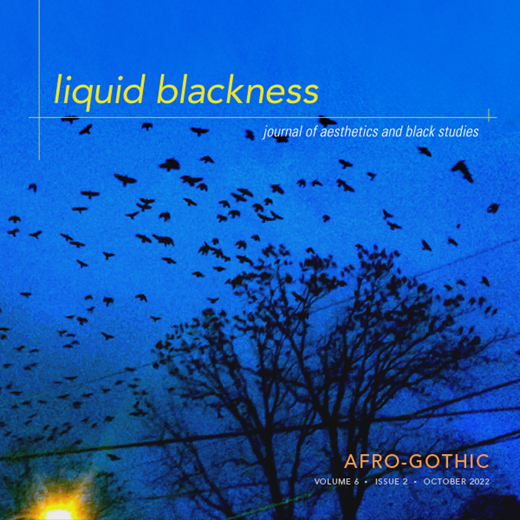liquid blackness: journal of aesthetics and black studies
The liquid blackness journal began in 2014 as an expression of the liquid blackness research group’s commitment to writing about rare art and archival material that the group was entrusted with by groundbreaking black visual artists. The journal grew into a forum for the exploration of audacious methodologies of the formal analysis of blackness in contemporary visual and sonic arts and popular culture at the intersection between the politics and ethics of aesthetics. While aggressively interdisciplinary, and therefore open to a wide array of contributions, the liquid blackness journal seeks to carve out a dedicated place for aesthetic theory and the most radical agenda of Black Studies to come together in productive ways. “Liquidity,” thus designates, among other things, a commitment to generative entanglements and to follow processes of intellectual production that are inspired by the experimental style of the jazz ensemble, which is what Fred Moten and Stefano Harney identified as a productive model for their idea of “black study.”
Since Spring 2021, our peer-reviewed, open access liquid blackness: journal of aesthetics and black studies has been published by Duke University Press, with the support of GSU’s Moving Image Studies doctoral program and the College of the Arts.
liquid blackness: journal of aesthetics and black studies is honored to have been awarded the 2023 Phoenix Award for Significant Editorial or Design Achievement by the MLA-affiliated Council of Editors of Learned Journal in recognition of our commitment to both editorial and design excellence that is foundational to the history, scope, and mission of our journal’s public-facing commitment to the study of black avant-garde practices.
Click Here for the journal, our submission guidelines,
our Editorial and Advisory Boards, and our current calls for papers.
The first seven issues of liquid blackness (2014-2017; Vol. 1, no. 1 - Vol. 4, no.7) document the history and research of the liquid blackness Research Group.


Founding Editor:
Alessandra Raengo, Georgia State University
Editors in Chief:
Alessandra Raengo, Georgia State University
Lauren McLeod Cramer, University of Toronto
Editorial Board:
Faye Raquel Gleisser, Indiana University
Charles “Chip” Linscott, Ohio University
Walton Muyumba, Indiana University
Michele Prettyman, Fordham University
Managing Editor:
Corey Couch, Georgia State University
Associate Editors:
Marquis Bey, Northwestern University
John Brooks, The Ohio State University
Erica Edwards, Yale University
Ekow Eshun, Curator (London, UK)
Kevin Jerome Everson, University of Virginia
Keith M. Harris, University of California, Riverside
Amy Herzog, City University of New York
Uri McMillan, University of California, Los Angeles
Advisory Board:
Anne Anlin Cheng, Princeton University
Thomas F. DeFrantz, Northwestern University
Jonathan Eburne, Penn State University
Amy Elias, University of Tennessee
Tatiana Flores, University of Virginia
Bishnuprya Gosh, University of California, Santa Barbara
R. A. Judy, University of Pittsburgh
Kara Keeling, University of Southern California
Barbara McCullough, filmmaker (Los Angeles)
Amber Musser, City University of New York
Mark Anthony Neal, Duke University
Marina Peterson, University of Texas, Austin
Angelo Restivo, Professor Emeritus, Georgia State University
Louis Ruprecht, Georgia State University
Christina Sharpe, York University
James Tobias, University of California, Riverside
James Gordon Williams, University of California, Santa Cruz









